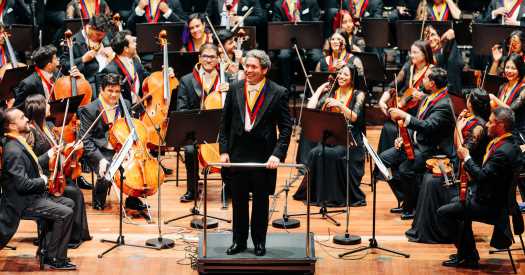When the superstar conductor Gustavo Dudamel took the podium at Usher Hall in Edinburgh on Saturday night to lead the Simón Bolívar Symphony Orchestra of Venezuela, there were the usual cheers from the audience.
But onstage, there was also a sense of joy and celebration: Dudamel had not performed with this 140-member ensemble since 2017, when he ran afoul of the Venezuelan government after criticizing the ongoing social and political crisis in his home country. He then stopped traveling there.
The reunion, at the Edinburgh International Festival, was emotional for Dudamel, who has led the orchestra since 1999 and said he missed performing with the musicians, many of whom he has known since they were children in El Sistema, the Venezuelan program that teaches music to young people.
“To have the chance to see them — to play music with them in person — is something that reconnects me with my soul, with my spirit,” he said in a telephone interview. “It’s really a very historical and special moment for us.”
Players in the ensemble said that they were energized by Dudamel’s return.
“It’s like we’re reborn,” Abner Padrino, a 31-year-old cellist, said in a telephone interview. “It feels like we’re playing at home.”
Kira Riera, a 31-year-old violist, said that Dudamel had helped improve morale in the orchestra. “He has brought really good energy to us,” she said. “It feels like the darkest times have just passed in Venezuela. We are now seeing some light once again.”
Dudamel, who also leads the Los Angeles Philharmonic and will become the music and artistic director of the New York Philharmonic in 2026, last appeared with the Simón Bolívar Symphony Orchestra in March 2017, on tour in Spain, Germany and Austria.
But in the months that followed, as unrest gripped Venezuela and a young El Sistema-trained viola player was killed during a street protest, Dudamel, who had resisted weighing in on politics, spoke out. He issued a statement saying that “enough is enough” and wrote an opinion piece in The New York Times, criticizing a government plan to rewrite the constitution.
The government of President Nicolás Maduro canceled the orchestra’s planned tour of Asia in apparent retaliation, a week before the ensemble was to depart, as well as another Dudamel-led tour with El Sistema musicians.
The orchestra entered a challenging period, with many of its top players leaving the country because of political and economic turmoil. Dudamel, feeling unable to return there, stayed in touch with the musicians by phone and video calls.
He finally went back to Venezuela last year, and spent time with friends and family. He also met with El Sistema students and teachers, and found time for a private reunion with the orchestra, leading a rehearsal of Mahler’s “Resurrection” Symphony in Caracas. He returned again in June, for rehearsals with the orchestra of a production of Beethoven’s “Fidelio” conceived for both hearing and deaf audience members.
Dudamel said that the political situation in Venezuela had improved to a point that he felt able to return. But, he added, there were still problems that needed to be addressed.
“People have the desire to get out of this unrest — this political, ideological unrest — and really make things move forward,” he said. “There has been a change, but we need to keep working to make things better because they are still very difficult.”
He said that he hoped to one day bring the Los Angeles Philharmonic and the New York Philharmonic there: “We are in a moment where we can start to build something — something that goes beyond the unrest.”
In Edinburgh, where the Simón Bolívar Symphony Orchestra was in residence this week, Dudamel led a performance of Mahler’s Symphony No. 1, as well as two works by Venezuelan composers: “Guasamacabra,” by Paul Desenne, who died this year; and “Odisea,” by Gonzalo Grau, a concerto for cuatro, a small guitar, featuring Jorge Glem on the instrument.
On Thursday, the orchestra performed Beethoven’s Symphony No. 9 and a work by Villa-Lobos, with the Venezuelan conductor Rafael Payare. Many of the orchestra’s players are under the age of 25 and have joined over the past year; Dudamel has overseen auditions in person and remotely.
Dudamel also met with students and teachers from Big Noise, a music education program in Scotland for disadvantaged children inspired by El Sistema. At the Scottish Parliament’s Festival of Politics on Friday, Dudamel spoke about his efforts to build on the legacy of his mentor, José Antonio Abreu, the celebrated Venezuelan educator who founded what became El Sistema in 1975. He described El Sistema as a “social project first and a cultural project second.”
“I have made it my personal mission not to rest until music is truly a fundamental human right for everyone,” Dudamel said. “El Sistema has endured through seven different governments in Venezuela. It is not about politics. It is about the shared belief that art must be a part of the fabric of society.”
Javier C. Hernández is a culture reporter, covering the world of classical music and dance in New York City and beyond. He joined The Times in 2008 and previously worked as a correspondent in Beijing and New York. More about Javier C. Hernández
Source: Read Full Article
